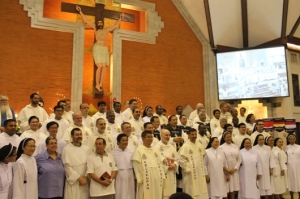The Dominican family (priests, brothers, sisters and laity) working for Justice, Peace and Care of Creation (JPCC) and the Journées Romaines Dominicaines (JRD) have started their Joint Conference themed “Dialogue as a way of Preaching” with an opening Mass at the Redemptor Mundi Church of Surabaya, the only parish run by the Dominicans in Indonesia, August 11, 2014.
In his homily, the chief celebrant and Bishop Vincentius Sutikno Wisaksono of Surabaya said that to have a dialogue is actually to be aware of the prescription to suffering, because to have a dialogue at a high level of living together requires suffering. He noted that it is not enough to have goodwill or good intentions, because sometimes all intentions will be denied and our gestures of goodwill be refused or rejected. “Let us strive for every effort to have dialogue despite many sufferings and difficulties,” the bishop said. The bishop also told the participants that the main basis for a true dialogue is respect for human dignity, for freedom, and for each other.
In his welcome address, the Prior Provincial of the Dominican Province of the Philippines, , noted that from the very beginning of the Dominican’s vocation “we are already called to be men and women of dialogue.”
On his part, chair of the International Dominican Commission for Justice and Peace, Father Carlos Rodriguez Linera, O.P., said that the Dominican family came “to share what it is in our heart and to search for the truth.”
He further stated that “dialogue is neither the conference nor the congress, but an attitude of our hearts. We open our hearts to God to realize and encounter our brothers and sisters because they are created as God’s image,” adding that they are here to show the world that dialogue is possible.
Participating in the conference from August 11-16, 2014, are over 90 participants: priests, brothers, sisters and lay people, drawn from 30 countries of all the continents. During the conference, they will focus around the central themes of “Fundamentalism and violence as realities of our world”; “The Word and the words of Dialogue” and “Dialogue as bridge-building towards peace”. (paul c pati)
